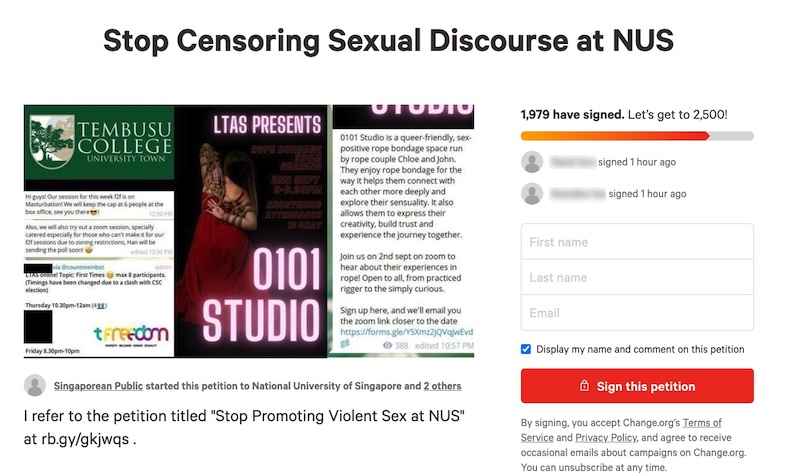Rope bondage talk axed, student group reviewed following petition against 'promoting violent sex' at NUS


An event about the little-known art of rope bondage that was organised by a group of students at the National University of Singapore (NUS)’s Tembusu College has been shut down following an online petition.
The petition’s author and the over 7,600 people who signed the petition believed that the student community, called tFreedom, had been “promoting violent sex” at the institution.
According to its profile on the Tembusu College website, tFreedom is an LGBTQIA+ affirming community that advocates for diversity and inclusivity through educational events about gender and sexuality. Within the community is a wing called Let’s Talk About Sex (LTAS), which is a safe space for consenting individuals to discuss and clarify their questions and opinions on things related to, well, sex.
One LTAS event that was meant to take place today (Sept 2) via video conference would revolve around rope bondage, which originates from the ancient Japanese art form of kinbaku — basically binding someone up as part of a sexual activity. The event would have featured the couple behind rope play space 0101 Studio for a glimpse into the subculture and the reasons why people participate in it.

Hope Leow, however, believes that “such dangerous fetishes should never be promoted in an educational institute”.
In his petition, Leow asserted that the event would "induce moral harm", “facilitates violent sexual fantasies among students”, promotes “life-threatening” sex acts and essentially breaks “the trust of parents”.
On top of all that, Leow stated that tFreedom promotes “loose sexual behaviour” by conducting LTAS sessions, which he believes consists of discussing sex and masturbation experiences that “only stimulate sexual fantasies”.
Through the petition, he demanded an explanation from the Ministry of Education (MOE) and NUS about how such “immoral and dangerous content” came to be permitted.
Over in the comments section, the fear and distress displayed by the signees were palpable.

It was on Monday (Aug 31) that tFreedom dismissed Leow’s claims, stating that the petition “mischaracterised the event and promoted misinformation” about the group.
A statement clarified that community has never promoted violent sex or non-consensual activities, and that the intention of the event was to let students learn about a lesser-known practice in a safe space. tFreedom affirmed that it was in no way meant to encourage or promote rope bondage.
Still, the group acknowledged that the way the event was presented and promoted could have been done better.
[embed]https://www.facebook.com/tembusufreedom/posts/1598966110278037[/embed]
“We acknowledge that the poster could have been better designed to more clearly communicate the discourse-driven aspect of the event,” the statement read.
“We regret that this lack of clarity has caused people to mistake the nature and intention of the event and caused some anxiety as a result.”
The event was ultimately called off, but not because of the controversy — tFreedom mentioned that the personal details of its members and the people of 0101 Studio had been uncovered and published online, opening them to harassment.
“We condemn the unauthorised sharing of personal information and the significant distress it has caused students. This is why the event in question has been cancelled in order to protect the privacy and mental health of those who are affected.”
In response, Leow maintained that the links to the tFreedom and LTAS Telegram messaging channels he published on the petition had been accessible to the public.
“If privacy is a concern of the admins, they can and should make it a private group and limit access to the list of participants within,” he wrote, adding that the petition neither outed names nor encouraged harassment.
Nonetheless, he urged people to stop harassing the students or members of 0101 Studio.

A counter-petition was then launched to call on NUS, MOE and Tembusu College not to censor sexual discourse at the institution, directly addressing Leow’s sentiments.
The anonymous petition author — who identified as a concerned member of the public — stated that the institutions should be protecting their students from harassment as they decide for themselves if they want to engage in discourse about sexuality and interpersonal boundaries.
”NUS students are not children. They are adults. Some of them have even taken up arms for our country. If they are deemed old enough to shoot a rifle, then they are old enough to engage in respectful and consensual discourse on sex. Nobody in the college is forcing students to attend these talks,” the petition author stated.
The counter-petition, however, garnered much less support, clocking a little over 1,970 signatures as of writing.
University spokesperson and associate professor at Tembusu College Kelvin Pang has since informed Coconuts Singapore that tFreedom’s operations will be “put on a hiatus” pending a review of its activities according to the Code of Gender and Sexual Respect.